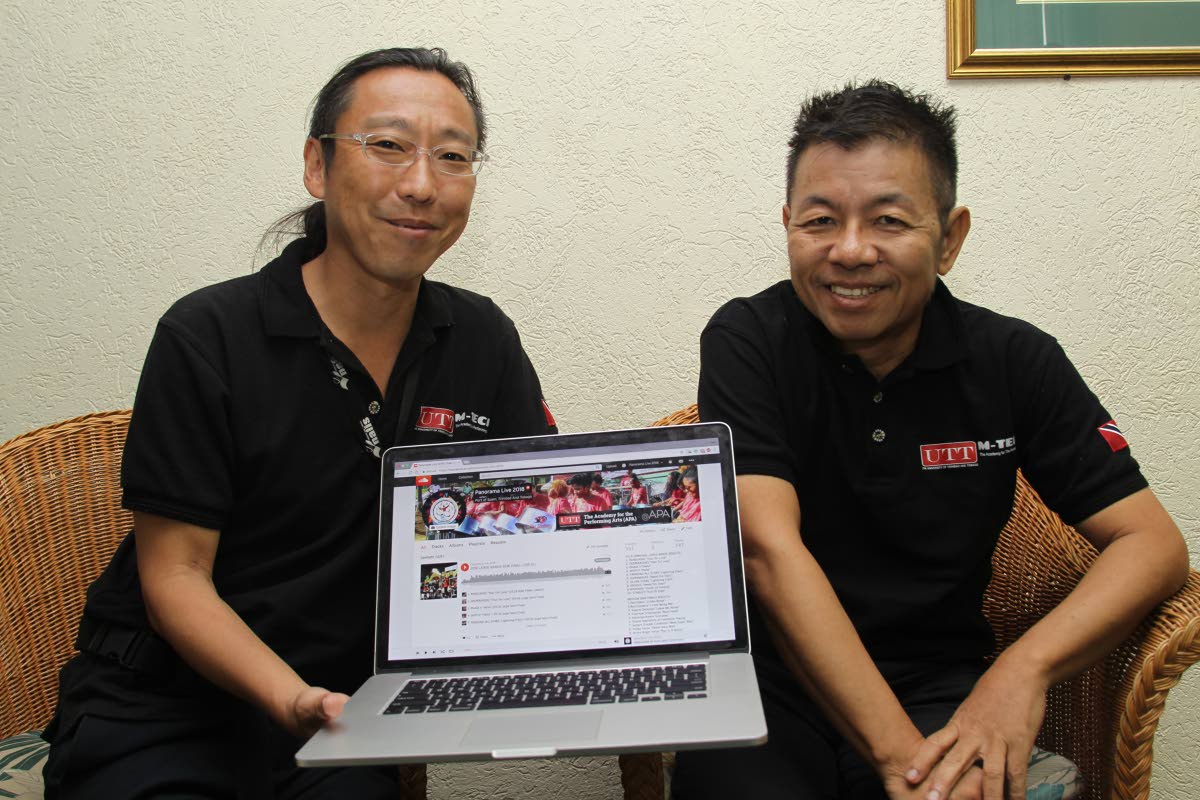Moving the music forward

YOICHI WATANABE’s affection for TT’s music began when he first experienced a Trini-style carnival in Brooklyn in 1987. He feels it was part of TT’s “golden era” of music and this left a lasting impression – so much so that years later, he made TT his home.
The 59-year-old instructor in music technology and audio engineering at the University of Trinidad and Tobago (UTT) left his New York city base after the devastating 9/11 attacks and came here. Watanabe and his partner Katsunari Imai are no strangers around Panorama and Carnival.
With pan at the heart of his affection, he has also worked, assiduously, to broaden and develop the national instrument. This year’s Panorama competition can be found as Panorama Live 2018 at soundcloud.com. The music provides a reference point for bands that have no way of hearing themselves play.
Besides producing five pan albums, Watanabe, with Pan Trinbago’s permission, is also moving to make the music available for download and purchase.
“My initiation to Trinidad’s music comes from New York. I was living in Brooklyn, New York. I had a music recording studio in downtown Brooklyn and that’s how I began encountering the people from this country. As soon as I participated in my first Carnival, which was 1987 (in Brooklyn), I was so impressed by Trinidad’s Carnival – actually I was addicted by the Carnival culture – I started to get in touch with Trinidad. Soca and Carnival has always been my favourite music,” he said.
Watanabe made his first visit to TT in 1990 to participate in Carnival. He visited TT regularly between 1990 and 2002.
During those visits he worked with some music greats, like Machel Montano, Sparrow and David Rudder. “I worked with Montano around the time of Big Truck. I assisted with the album of Footstep.”
When Watanabe sold his studio, in New York, in 1999, he worked in music production elsewhere – between New York and Japan – and then 9/11 happened.
“That was 2001 and all of a sudden there was 9/11. It really hit us so hard. It was devastating. I was supposed to be living this normal life and all of a sudden it is just not there. I was struggling with my partner.
“My partner and I (Katsunari Imai, media archive producer and audio engineering officer), we lived in New York and experienced 9/11 and there was no music for almost three days. It was just news, news, news. All I was listening to a Caribbean radio station and I started hearing pan. So that was when I decided,” he said of his move to TT.
It was not long before he began transferring his skills to students at UTT in 2002.
Before that, Watanabe did freelance music recording and production and also began recording pan. “I produced a commercial album for Japan and it was successful. The end result is that I produced five albums and it became the most sold pan album.”
But Watanabe’s reason for recording was more altruistic than commercial.
“I wanted to acclimatise myself to the culture, and I found that not much recording is done at the preliminary stage of the pan judging. Many bands don’t make it; there is no chance that they can hear themselves, since no one is recording them, and I thought that was really bad and sad.
“Some of the performances are not suited for the Panorama competition, but are pretty or nice and sweet. I wanted to take the opportunity to let them hear themselves and also encourage the members, since there were so many youngsters playing who did not have a chance to listen to what they were playing...That is how we started archiving,” he said of his reason for recording and archiving the music.
Watanabe began by giving the bands a hard copy of the recording. “Distribution before was quite hard but now we have soundcloud.com and it is called Panorama Live 2018. All the recordings we have, is uploaded there so that the people could listen for free,” he said. This is the third time online streaming is being done because, before, the duo had not got Pan Trinbago’s agreement.
Watanabe’s work has acquired a fan base of over half a million people on soundcloud.com. This has resulted in a broader audience for pan.
“Since we have soundcloud, we have gotten access to people in the UK, US and Japan as well.” But Watanabe believes that there could be even more exposure for pan.
Recognising a need for his students to become even more aware of pan, Watanabe has made Panorama a part of their training.
“I made Panorama to be the training field for students. To me, it is quite important...I would ask my students, ‘How many of you went to Panorama?’ and it would be very few, I have 30 students, but we found like three or four took part – but they were players.
“But besides that, the majority of the younger generation, they have no relation to pan. When you look at your pan event, the players are younger, but the audience is older. The younger generation cannot relate to it. Many of them expressed to me they watched it on TV but the sound was not great, so they don’t bother.”
Watanabe, however, feels: “Carnival has a special technique and technology. Pan is a music technology. I really respect and appreciate it.” While he has visited carnivals around the world in places such as Jamaica, Barbados, Antigua, Brooklyn, and Notting Hill, TT always calls him back. He Watanabe plans to visit Brazil’s carnival next year – but only after TT Carnival and Panorama.



Comments
"Moving the music forward"